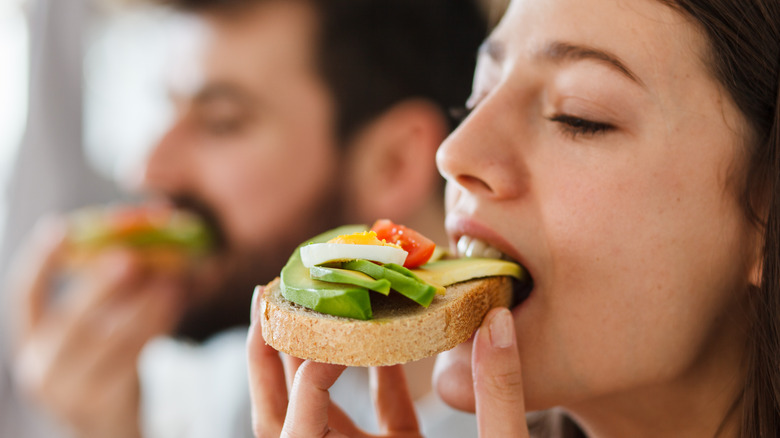Avoid Eating Too Much Avocado If You Have This Medical Condition
In the world of health and nutrition, experts have long praised the almighty avocado. Researchers from a 2013 scientific review published in Critical Reviews in Food Science and Nutrition cite that in just one half of a Hass avocado, you'll receive 4.6 grams of fiber, 345 milligrams of potassium, and 19.5 milligrams of magnesium. Along with other essential nutrients like vitamin A, E, and K, avocados are made up of over 70% monounsaturated fatty acids and 13% polyunsaturated fatty acids, making them a stellar source of healthy fats.
Avocados being high in healthy fats may be good news for our cholesterol or heart health, but can also be bad news for those with irritable bowel syndrome (IBS), according to Monash University. Affecting anywhere from 7% to 18% of people worldwide, individuals with IBS experience abdominal discomfort and changes in the texture or frequency of their bowel movements (via Annals of Medicine and Surgery). This may include diarrhea or constipation, depending on what type of IBS a person has. In addition to being high in fat, avocados are also considered a FODMAP food. Here's what that means for people with IBS.
Why people with IBS should avoid eating FODMAP foods
As outlined in a 2023 research article published in Cureus, FODMAPs are fermentable oligosaccharide, disaccharide, monosaccharide, and polyol carbohydrates that have been linked with uncomfortable gastrointestinal symptoms due to the fact that they're unable to be properly absorbed by the intestines. Subsequently, people with IBS are advised to stick to a low FODMAP diet. This means steering clear of avocados, which fall under the category of "forbidden foods," as highlighted in the research.
What makes avocados a FODMAP food is their sorbitol content, which is a kind of sugar polyol (the P in FODMAP) that the body can only partially absorb. Naturally found in some foods, sorbitol is sometimes alternatively used as an artificial sweetener, which is why it, too, lands on the list of "forbidden foods." More recently, however, Monash University researchers found that it may not be avocados' sorbitol content we have to blame for their FODMAP status after all, but rather a different carbohydrate altogether.
How much is too much avocado to eat?
Knowing that the chemical makeup of foods can change in the long run, the minds behind the low FODMAP diet at Monash University recently revisited avocados for FODMAP testing. Over a decade earlier, the researchers had found avocados to contain high amounts of sorbitol. This time around, however, avocados did not show evidence of high sorbitol content. Instead, the team found the presence of perseitol, another kind of sugar polyol found only in avocados. While perseitol is not as thoroughly understood as sorbitol, as a FODMAP, we know that sugar polyols can cause trouble for people with IBS. In fact, perseitol has a larger molecular makeup than sorbitol, making it more difficult to absorb and more likely to cause gas or diarrhea.
For this reason, avocados will remain on the high-FODMAP list. In light of these findings, however, the university's guidance has shifted depending on how much avocado you wish to eat. A 1-ounce serving of avocado used to qualify as a low FODMAP serving, which has now been adjusted to just over 2 ounces (via A Little Bit Yummy). While eating a 2-ounce serving of avocado may prove tolerable for some people with IBS, you'll want to avoid eating too much more, as this will tip the fruit's ranking into the "moderate" to "high" FODMAP zone.



